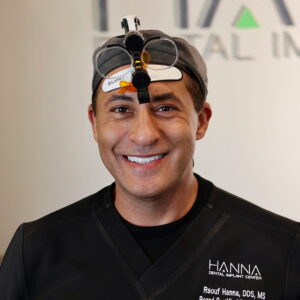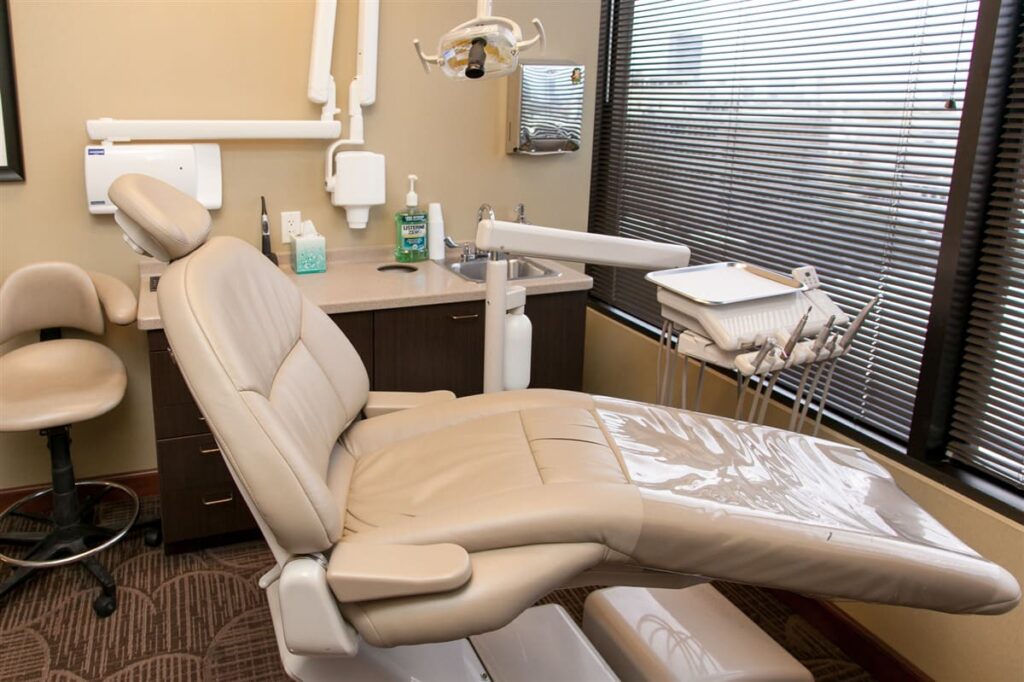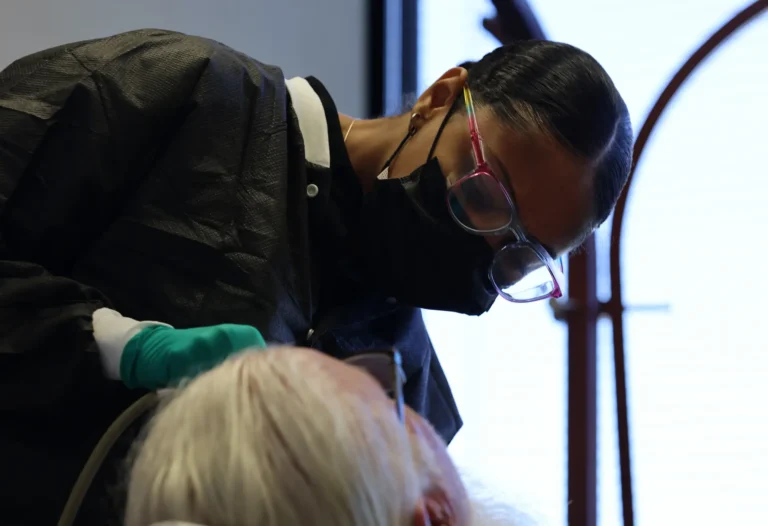A: Whatever discomfort, whatever issues that were occurring with the tooth that was in stress, decay, or missing—will go away. The dental implants and the restoration on top will basically give you almost 100% tooth structure that you had previously.
So, you’ll find that people—if it’s only one tooth they’re still eating pretty well. But, they might say, “I had food get trapped over here” or, “I’m drinking and I can feel fluid moving through that area.”
Putting the tooth back where it naturally was, then—you don’t have those feelings anymore or food trapped anymore. So, it does allow you to get back to eating and drinking normally.
Teeth are one of the most important components of your mouth. Besides helping to speak, they also are important for getting nutrition. That is why it’s so important to take good care of teeth like brushing, flossing, and getting regular checkups.
If you abandon any part of your dental care routine, you can quickly find yourself deep in dental problems. These issues that can arise can prove to be detrimental to your teeth which also affects your overall health.
Issues such as tooth decay or gingivitis when left untreated, lead to tooth loss. If you have to have teeth removed you can suffer serious consequences if they’re not replaced. Of course, sometimes tooth loss comes as a result of dental trauma. Things like car accidents or sporting injuries can result in tooth loss.
The Complications Of Tooth Loss
Regardless, you must have those teeth replaced with a true permanent replacement—not dentures or bridges. There’s a reason why we lean so hard on dental implants as the ideal treatment for tooth loss—because it is. Without dental implants, so much of your daily life is impacted negatively.
Trouble Eating And Chewing
Teeth are critical components for chewing your food—especially proteins such as meat and fish. When you chew food it is breaking it down so that your body can process the nutrients in the food and absorb them.
However, with tooth loss, you struggle to break down the food enough for your body to digest it properly. This leads to malnutrition as many patients get so frustrated, they skip many nutrient-rich foods. Often they end up eating softer less nutritious foods because they’re easier to handle.
Not only that, but the food you do need such as lean meats, fibrous vegetables, and leafy greens make your body work harder. It’s working harder because the teeth didn’t break down the food as much. This leads to a lot of discomfort when and after eating. You can expect conditions such as nausea, excessive flatulence, constipation, and nutrient deficiencies.
Trouble Speaking And Forming Words
Teeth also play a huge role in your ability to speak and form words and sounds. They regulate airflow when you talk that makes sounds like P’s and S’s among a dozen more. You never really factor just how often teeth come into play when speaking until they’re gone.
Even losing just one or two teeth can make a distinguishable impact on how you sound. You may develop a speech impediment such as a lisp which can be traumatizing—especially if you’re a people person. Often, people who you speak to and have for years, may suddenly not understand you—it’s a sobering reality.
Smile Impact
Your teeth make up about 95% of your smile and how healthy and appealing it looks. Your smile also affects about 75% of your self-confidence. People with healthy smiles with bright white teeth, often carry themselves with more confidence. This means they leave a solid impression on those they meet. However, when you suffer tooth loss, you immediately experience a shift in confidence. You tend to hide your smile, staying tight-lipped trying to hide any gaps in your teeth. Ironically, that disposition can leave the wrong impression as well.
Facial Structure Changes
Most of the problems that tooth loss brings are evident immediately, however over time something else happens. Tooth loss causes your jawbone to deteriorate and in such a way that it changes your facial structure. You end up looking vastly different and it can take a year or a few years but, often people look unrecognizable.
In normal conditions, your jawbone is constantly losing bone mass as you chew, and bite, etc. However, when you have teeth, the roots stimulate the jawbone. This signals the jawbone to draw nutrients from the bloodstream to constantly replenish bone mass. So, in essence, your jaw is under constant erosion and restoration.
However, without the teeth to stimulate the jawbone, the erosion continues but the restoration does not. If you’ve lost an entire arch or all of your teeth this effect is compounded even more. People that suffer from this often have a sunken-in face or look very old for their age. It’s quite a difficult emotional situation for most people.
Reverse The Problems Of Tooth Loss
Let’s just cut to the chase—dentures, bridges, and any other non-permanent solution to tooth loss is no solution at all. If the jawbone is not stimulated, dentures will eventually stop fitting properly, bridges will fall out. This is because as the jawbone deteriorates if there’s remaining teeth, they shift. Even if you have no teeth, the jawbone changes alignment and dentures won’t fit right.
Dental implants on the other hand are a one-time, one-cost, permanent solution for tooth loss. It allows you to maintain your quality of life and even improve it. They are the only solution that is an identical match to teeth in form, function, and feel.
The Impact Dental Implants Have On Your Diet
Dental implants are the ultimate solution to improve your nutrition, diet, and allow you to eat normally again. Dentures, bridges, and partials just can’t offer the same benefits dental implants do.
Dentures decrease your bite force by nearly half—that’s going to cause some serious issues eating. Because dentures are just sitting on your gums with messy adhesive, they physically can’t exert much force. This means you are restricted heavily on what you can physically eat and digest.
Do you like corn on the cob? Fresh carrots? Smoked Ribs? You’ll find that it’s very hard to eat these foods and hundreds of others. Even after you adjust to your dentures and your gum bed has strengthened, the bite strength won’t increase much.
Dental implants on the other hand maintain your jawbone strength and retain at least 90% of your bite strength. In addition, implants also allow you to:
Chew Naturally
Dentures tend to have constant issues with slippage while being used to chew food. Often, they come right out causing embarrassment for the wearer. This is because chewing involves a multi-directional movement and motion range that dentures cannot replicate. It’s more of a chomping action than chewing—up and down only, which is not natural or effective.
Dental implants, since they are permanently part of your body, can’t come dislodged while eating or speaking. So you can feel free to chew as you see fit for whatever you’re eating.
Have A Full Range Of Taste
Did you know that your tongue has thousands of taste buds that your brain uses to taste different flavors? You probably did, but not many realize there are also taste buds on the roof of your mouth that work with the tongue to taste.
However, if you have dentures, you won’t be able to feel or use the roof of your mouth for taste. Because dentures have a plate that covers the palate, so your taste of food will be seriously limited. You may find that foods you like before, may taste different with dentures.
With dental implants, there’s no plate, so you can experience all of the tastes of your food and drink without interference.
Dental Implants Are The Only True Solution For Tooth Loss
If you are suffering from tooth loss, don’t settle for a mediocre solution that does nothing for your health. Call Comprehensive Dental Group of Houston to schedule your free consultation to see your options for dental implants. Contact us today to book!

Dr. Raouf Hanna is a double board-certified specialist recognized worldwide for his expertise in dental implantology. With advanced training and decades of experience, he has restored countless smiles through procedures ranging from single implants to full-arch restorations. His focus on precision, innovation, and patient-centered care ensures exceptional results for every case.
In addition to his clinical work, Dr. Hanna is a respected educator and former Clinical Associate Professor of Periodontics at the University of Texas. He has contributed significantly to the advancement of implant dentistry through his teaching, research, and development of multiple patented technologies that have significantly influenced modern treatment techniques.
At The Comprehensive Dental Group of Houston, Dr. Hanna combines his surgical skill with state-of-the-art technology to help patients achieve lasting, natural-looking results.





